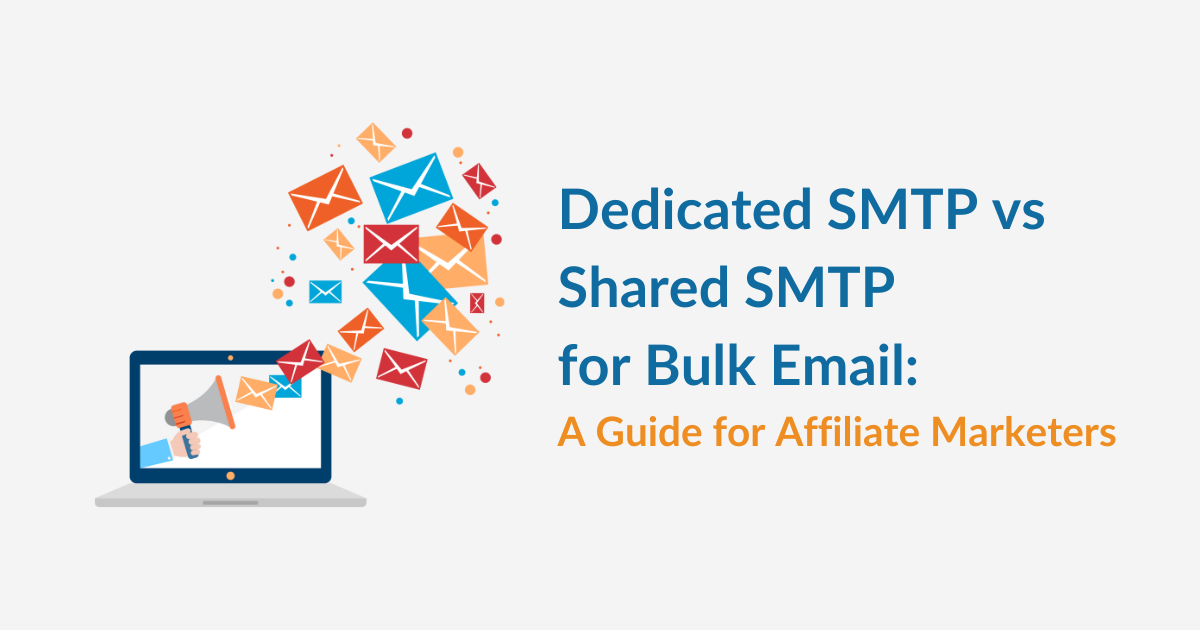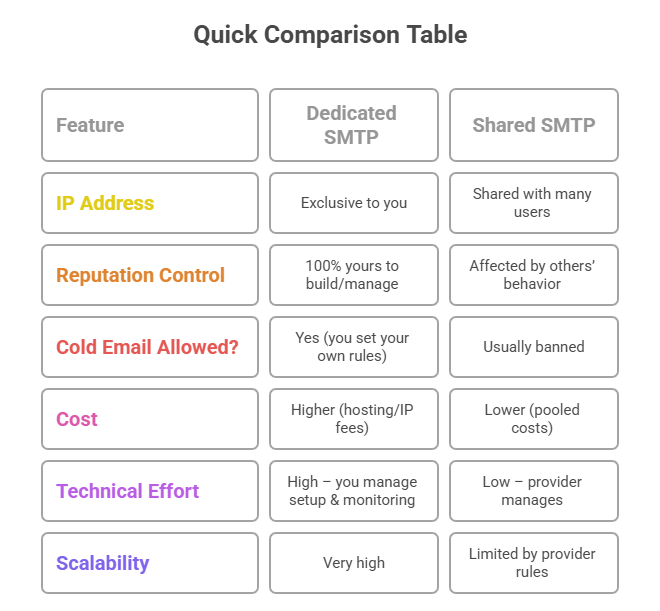
Dedicated SMTP vs Shared SMTP for Bulk Email: A Guide for Affiliate Marketers
Author: MailClickConvert
Last Updated: August 13, 2025
If you run affiliate campaigns or send cold outreach emails, the type of SMTP server you use can make or break your results. Choosing between a dedicated SMTP server and a shared SMTP server isn’t just a technical detail—it affects your deliverability, compliance risk, and revenue.
This guide explains what SMTP servers are, the difference between dedicated and shared setups, and why dedicated SMTP is usually the best choice for bulk mailing—especially for cold email and purchased lists.
What Is an SMTP Server?
SMTP stands for Simple Mail Transfer Protocol—the system that sends your emails from your outbox to your recipients. Think of it as your campaign’s digital post office. When you send thousands of emails, the SMTP server handles:
- Routing your messages to the correct mailboxes
- Managing authentication (SPF, DKIM, DMARC)
- Handling bounces and complaints
- Working with inbox providers to get your emails delivered
In bulk email marketing, the SMTP server’s reputation plays a huge role in whether you land in the inbox or spam.
Dedicated vs Shared SMTP: The Key Difference
The main difference comes down to IP address ownership:
- Shared SMTP server – You share the same IP address and sending infrastructure with other users.
- Dedicated SMTP server – You have your own IP address and sending environment that only you use.
That distinction affects everything from deliverability to compliance.
Shared SMTP Servers: Pros and Cons
How it works:
Shared SMTP servers are managed by an email service provider (ESP). Multiple senders use the same IP pool, which the ESP maintains.
Advantages:
- Low cost or even free to start
- Easy setup with minimal technical skills
- Provider manages server maintenance and updates
Drawbacks:
- You inherit the reputation of other senders—one bad actor can hurt everyone
- Strict sending rules (most shared SMTP providers ban cold outreach and purchased lists)
- Sending limits to prevent abuse
- Risk of sudden account suspension
Example:
Mailchimp, Constant Contact, and most ESPs use shared SMTP pools. They explicitly ban purchased lists and affiliate campaigns. Try sending to a cold list, and you risk having your account shut down before your campaign even finishes
Dedicated SMTP Servers: Pros and Cons
How it works:
A dedicated SMTP server or dedicated IP is used exclusively by you. Your sending reputation is based only on your behavior.
Advantages:
- Full control over your sender reputation
- Freedom to send cold outreach and affiliate campaigns (within legal limits)
- Higher sending volumes without provider throttling
- Customizable authentication and sending rules
Drawbacks:
- Higher cost (server hosting, dedicated IP fees)
- Requires technical know-how (DNS setup, IP warm-up, blacklist monitoring)
- Mistakes can directly harm your own IP reputation
Pro tip:
Dedicated SMTP works best when you send consistent volumes and follow deliverability best practices. A fresh IP blasting huge lists without warm-up is a fast track to spam folders.

Why Dedicated SMTP Is Better for Bulk Mailing in Affiliate Marketing
If you’re sending cold outreach or to purchased lists, dedicated SMTP offers key advantages:
1. No ESP Policy Blocks
Shared SMTP providers enforce strict anti-spam policies. Dedicated SMTP lets you send to purchased data (legally) without triggering automated bans.
2. Control Over Reputation
Your sender score isn’t affected by someone else’s bad sending habits. You can warm up your IP, maintain low complaint rates, and build trust with inbox providers.
3. Scalable Sending Power
Need to send 500,000 emails in a day? Dedicated SMTP lets you control sending speed and add more IPs as needed.
4. Domain Reputation Protection
Affiliate marketers often use a separate domain for cold email. Dedicated SMTP makes it easy to isolate campaigns from your main domain.
Cost & Setup Considerations
- Shared SMTP: Low monthly fees or free tiers. Great for beginners, but not viable for cold outreach.
- Dedicated SMTP: Expect $20–$100/month for hosting and IPs, plus time for setup and monitoring.
Setup checklist for dedicated SMTP:
- Configure SPF, DKIM, and DMARC
- Warm up new IPs gradually
- Use verified and cleaned email lists
- Monitor blacklists and complaint rates
Why Multiple SMTPs Can Be a Game-Changer
Modern bulk email tools like MailClickConvert now let you connect any SMTP provider—and even run multiple SMTPs in parallel.
Benefits for affiliate marketers:
- Failover protection – If one SMTP has issues, switch instantly
- Deliverability testing – Compare providers’ inbox placement
- Load balancing – Split large sends across multiple IPs
- Cost optimization – Use different providers for different volumes
MailClickConvert’s multi-SMTP feature means you can manage campaigns centrally while choosing the delivery infrastructure that fits your strategy.
Best Practices for Using a Dedicated SMTP Server for Bulk Mailing
- Warm up your IPs before full-volume sending
- Segment and clean your lists regularly
- Rotate sending domains for high-volume cold campaigns
- Include clear unsubscribe options to comply with CAN-SPAM
- Track open, click, bounce, and complaint rates to adjust strategy
Final Takeaway
For affiliate marketers, a dedicated SMTP server for bulk mailing isn’t just a technical upgrade—it’s the foundation for scalable, compliant, and high-deliverability email campaigns.
Shared SMTPs are fine for opt-in newsletters and small sends, but if you’re serious about cold outreach or high-volume affiliate campaigns, dedicated SMTP gives you the control, freedom, and consistency you need. And with tools like MailClickConvert letting you plug in multiple SMTPs, you can build a sending infrastructure that’s both powerful and flexible.

